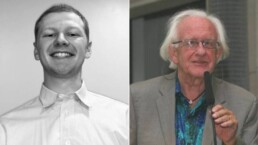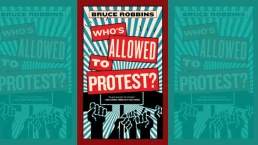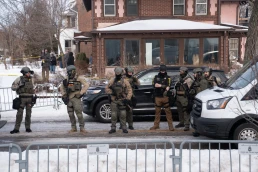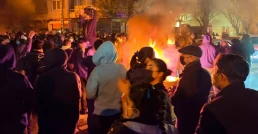“I will no longer be complicit in genocide,” Aaron Bushnell said. “I am about to engage in an extreme act of protest.”
By Amy Goodman & Denis Moynihan, Democracy Now!
The world recently lost two principled opponents of war, but under drastically different circumstances. Johan Galtung died on February 17th at the age of 93. The Norwegian sociologist was known as the father of peace studies, and spent his life researching conflicts and fostering dialog in pursuit of peace.

Aaron Bushnell was just 25 years old. He was an active duty member of the US Air Force. On Sunday, February 25th, Aaron Bushnell started a live video stream as he walked toward the Israeli Embassy in Washington, DC.
“I will no longer be complicit in genocide,” Bushnell said. “I am about to engage in an extreme act of protest, but compared to what people have been experiencing in Palestine at the hands of their colonizers, it’s not extreme at all. This is what our ruling class has decided will be normal.”
Standing at the embassy’s gate, with the video still running, he doused himself with a liquid and set himself on fire. His final words, shouted several times as the flames consumed him, were “Free Palestine! Free Palestine!” As an officer pointed a gun at Aaron, a second officer yelled, “I don’t need guns. I need a fire extinguisher.”
Aaron was formally declared dead hours later.
Earlier that day, he posted a link to the live stream, with the caption, “Many of us like to ask ourselves, ‘What would I do if I was alive during slavery? Or the Jim Crow South? Or apartheid? What would I do if my country was committing genocide?’ The answer is, you’re doing it. Right now.”
Levi Pierpont was a friend of Aaron’s. They met in basic training at Lackland Air Force Base in San Antonio, Texas. Speaking on the Democracy Now! news hour, days after Aaron’s death, Levi said they both joined the military “to explore the United States, to explore the world, to meet people from other backgrounds.” He went on, “over the years, both of us shifted in our beliefs regarding war, largely because of what we saw in the military, because we were a part of it. I know that he and I both were encouraged by people on YouTube that were writing video essays about social justice movements in the United States.”
“I did end up getting out as a conscientious objector,” Levi continued. “We spoke throughout that process. And at the time that I began to make headway with the process and it began to near its end — I got out in July of 2023 — he felt like he was already close enough to his own end date that he decided not to take the same path. And I understood that, because the conscientious objector process can take over a year.”
Johan Galtung was also a conscientious objector, as a young man in Norway. As a child, Nazi Germany occupied his country, and imprisoned his father. In one interview, he recalled how his mother made him read the newspaper to learn the names of political prisoners who the Germans had executed the day before, to see if his father was among them, to spare her the pain of reading the list. His father survived, but the war forever changed Johan. He devoted his life to bridging divides, and finding creative solutions to real-world conflicts.
“I look forward to the U.S., instead of intervening militarily, starting solving conflicts,” Galtung said on Democracy Now!, in April 2012. “You have so many bright people in this country, so many well-educated people. Solving conflict, you have to talk with the other side, or the other sides. You have to sit down with Taliban and al-Qaeda people or people close to al-Qaeda. You have to sit down with Pentagon people, State Department people. And you have to ask them, “What does the Afghanistan look like where you would like to live? What does the Middle East look like where you would like to live?” You get an enormous amount of very thoughtful people having very deep reflections.”
Levi Pierpont mourns the loss of his friend, and wishes Aaron hadn’t taken his own life.
“I don’t want anybody else to die this way. If he had asked me about this, I would have begged him not to. I would have done anything I could to stop him. But, obviously, we can’t get him back,” Levi said on Democracy Now!. “I would have told him that this wasn’t necessary to get the message out. I would have told him that there were other ways.”
Having expressed his deep sorrow, Levi concluded, “He didn’t have thoughts of suicide. He had thoughts of justice. That’s what this was about. It wasn’t about his life. It was about using his life to send a message.”
Recent Posts
Trump’s Concentration Camp Build-Out Includes Nearly $40 Billion for Warehouse Conversions
February 14, 2026
Take Action Now “Germany’s concentration camps didn’t start as instruments of mass murder, and neither have ours,” wrote talk show host Thom…
Everyone Is Allowed To Protest
February 13, 2026
Take Action Now Tied up with the apparently very longstanding tradition of claiming that all opponents of atrocities are purely engaged in what has…
Abolition Is Still The Only Way Out Of This
February 13, 2026
Take Action Now Forget the useless so-called “reforms” to ICE and policing currently on offer. We need much more fundamental change.By Andrea J.…
Leading Papers Call For Destroying Iran To Save It
February 11, 2026
Take Action Now The opinion pages of the New York Times and Washington Post are offering facile humanitarian arguments for the US to escalate its…




